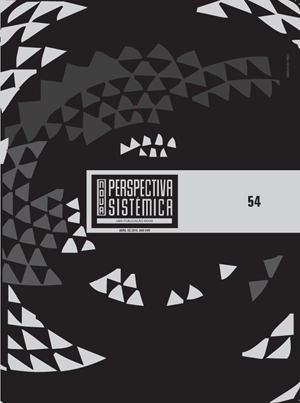Narrativas estratégicas para a mudança organizacional
a perspectiva da linguagem poética
Palavras-chave:
cocriação, linguagem poética, construcionismo socialResumo
Com toda a revolução tecnológica, cultural, social e política, entramos em um novo paradigma de um mundo conectado, globalizado e com novos desafios a serem enfrentados. Teorias e clássicos métodos de intervenção e mudança parecem não serem suficientes neste novo contexto. Especificamente no campo organizacional, estamos passando por momentos de crise e de mudanças. Está se tornando necessário ressignificar o papel das empresas, o papel dos líderes, o papel dos processos burocráticos e o papel dos valores. O presente artigo traz o entendimento da linguagem como construção social, como uma possível ferramenta de mudança da lógica organizacional. Nesse cenário, a linguagem poética se apresenta como um recurso de construção e ressignificação de sentido, promovendo também a possibilidade de reinvenção organizacional.
Downloads
Referências
Bauman, R. (2000) Language, identity, performance. Pragmatics 10:1.1-5 International Pragmatics Association.
Boje, D. M. (1995). Stories of the storytelling organization: A postmodern analysis of Disney as "Tamara-Land".Academy of Management Review 38 (4):997-1035.
Boje, D. M. (2001) Narrative Methods for Organizational & Communication Research. New Mexico State University, USA. Sage series.
Camargo-Borges, C. &Rasera, E.F (2013). Social Constructionism in the Context of Organization Development Dialogue, Imagination, and Co-Creation as Resources of Change. SAGE Open. April-June . vol. 3no.2
Castells, M. (2004). Informationalism, Networks and the Network Society: A theoretical blueprint. In: The network society: a cross-cultural perspective, Northampton, MA: Edward Elgar.
Cunliffe, A. L. (2000). Social poetics: possibilities for critical and postmodern research. Las Vegas: University of New Hampshire.
Guanaes, C. (2006). A construção da mudança em terapia de grupo: um engoque construcionista social. São Paulo, Brasil: Vetor.
Gergen, K. J. (1985). The social constructionist movement in modern psychology. American Psychologist. 40, 266-275.
Gergen, K. J. (1997). The place of the psyche in a constructed world. Theory and Psychology, 7(6):723-746.
Gergen, K.J. (2015). An Invitation to Social Construction. London: Sage. 3rd Edition.
Gergen, K. & Gergen, M. (2004). Social Construction: Entering the Dialogue. Chapter 1. Taos Institute; Publishing Chagrin Falls, OH.
Gergen, K.J. (2001) Social construction in context. London: Sage.
Gittell, J.H. & Douglass, A. 2012. Relational bureaucracy: Beyond bureaucratic and relational organizing. Provisionally accepted, Academy of Management Review.
Grandesso, M. A. (2000), Sobre a Reconstruc?a?o do significado: Uma Ana?lise Epistemolo?gica e Hermene?utica da Pra?tica Cli?nica, Sa?o Paulo: Casa do Psico?logo.
Gribbin, J. (2002). Science: A History. London: Allen Lane / Penguin. New York: Penguin Books, 2003.
Hypeness (2015) Neste café no Rio de Janeiro, second-linevocê decide quanto quer pagar. Disponível em:
http://www.hypeness.com.br/2014/05/neste-cafe-no-rio-de-janeiro-voce-decide-quanto-paga/. Acesso em: 20/08/2015.
Kotler, P. & Caslione, J. (2009). Chaotics: the business of managing and marketing in the age of turbulence. New York: Amacom.
McMillan, E. (2008). Complexity, management, and dynamics of change: changes for practice. USA: Routledge.
McNamee, S. & Gergen, K.J. (1998). Relational responsibility: Resources for sustainable dialogue. Sage Publications.
Projeto Draft (2015).Vagas: a incrível empresa que não tem metas financeiras nem hierarquia — e cresce 25% ao ano. Disponível em: http://projetodraft.com/vagas/#sthash.OCYkH1F7.dpuf . Acesso em 20/08/2015.
Ramirez, R. (1999). Value co-production: Intellectual origins and implications for practice and research. Strategic Management Journal, 20:49-65.
Sisodia R.S., Wolfe D.B., Sheth J.N. (2007). Firms of endearment: How world-class companies profit from passion and purpose. Wharton School Publishing, Prologue.
Spink, M. J. P. & Medrato, B., 1999. Produção de sentido no cotidiano: Uma abordagem teórico-metodológica para análise das práticas discursivas. In: Práticas Discursivas e Produção de Sentidos no Cotidiano: Aproximações Teóricas e Metodológicas (M. J. P. Spink, org.), pp. 41-61, São Paulo: Cortez Editora.
Suchman, A. L. (2011) Organizations as Machines, Organizations as Conversations: Two Core Metaphors and their Consequences. Medical Care, V.49, number 12, supl.1 , p43-48.
Taylor, D. (2001). Tell Me a Story: The Life-Shaping Power of Our Stories. Bog Walk Press.
Tetenbaum, T. J., (1998). Shifting paradigms: From Newton to chaos, Organizational Dynamics, Spring 1998:21-32.
Vargo, S. L. & Lusch, R. F. (2004). Evolving to a New Dominant Logic for Marketing, Journal of the Academy of Marketing Science 68: 1-17.
Vargo, S. L. & Lusch, R. F. (2008). Service-dominant logic: continuing the evolution, Journal of the Academy of Marketing Science 36(1): 1-10, published online 1 August 2007.
Wolfe, D & Snyder, R. (2004). Ageless Marketing: Strategies for Reaching the Hearts and Minds of the New Customer Majority. Dearborn Trade publishing, p. 20.
Zandee, D. (2011) Sustainable organizational development as generative process: About play, poetry and provocation. Nyenrode Business Universiteit.
Zuboff, S. & Maxmin, J. (2002) The Support Economy: Why Corporations are Failing
Individuals and the Next Episode of Capitalism. New York: Allen Lane.
Downloads
Publicado
Como Citar
Edição
Seção
Licença
Autores que publicam nesta revista concordam com os seguintes termos:- Autores mantém os direitos autorais e concedem à revista o direito de primeira publicação, com o trabalho licenciado simultaneamente sob uma Licença Creative Commons Attribution após a publicação, permitindo o compartilhamento do trabalho com reconhecimento da autoria do trabalho e publicação inicial nesta revista.
- Autores têm autorização para assumir contratos adicionais separadamente, para distribuição não-exclusiva da versão do trabalho publicada nesta revista (ex.: publicar em repositório institucional ou como capítulo de livro), com reconhecimento de autoria e publicação inicial nesta revista.
- Autores têm permissão e são estimulados a publicar e distribuir seu trabalho online (ex.: em repositórios institucionais ou na sua página pessoal) a qualquer ponto antes ou durante o processo editorial, já que isso pode gerar alterações produtivas, bem como aumentar o impacto e a citação do trabalho publicado (Veja O Efeito do Acesso Livre).

















